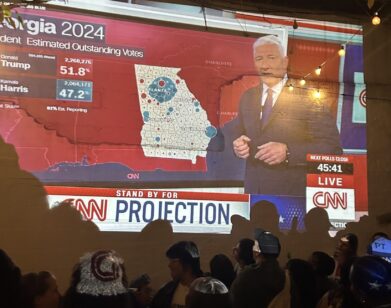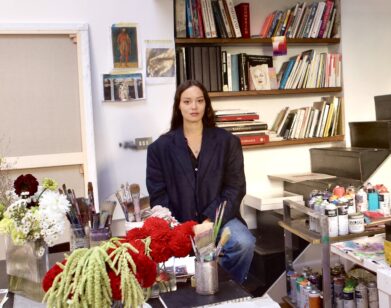John Bishop: Comedian, Actor, Conversationalist

ABOVE: JOHN BISHOP. PHOTO COURTESY OF STEVE NEAVES.
John Bishop exudes warmth. Part of it is the musicality of his thick Liverpool accent and the color it adds to his storytelling. A lot of it, however, is the intimacy of his comedy: the way in which he talks about his wife of 24 years, Melanie, and their three sons, who, he reiterates frequently in his stand-up shows, think he’s “a knob;” or how he describes his transition from being a pharmaceutical representative to arguably the most successful comedian in Britain as almost accidental. As is the hallmark of any great comedian, Bishop makes the specific—specific to England, to Liverpool, to his background—feel universal.
In his current television series, John Bishop: In Conversation With…, Bishop puts his affability to good use. Each episode revolves around a one-on-one conversation between Bishop and a celebrity that is both a probing of public image and personal life details. In the first season, Bishop spoke to actors, comedians, musicians, and athletes such as James Corden, Steve Coogan, Charlotte Church, Rupert Everett, Miriam Margolyes, and Freddie Flintoff; in the second season, which premiered last night in the U.K., he takes on the likes of Lindsay Lohan, Olly Murs, Ken Loach, and Russell Brand.
When we speak with Bishop over the phone, he is spending the week at home with his wife and menagerie of rescue animals. It is but a brief respite: with a third season of In Conversation With… already confirmed, a new U.K. comedy tour titled “Winging It” starting in the autumn, and a role in the upcoming ITV drama Fearless opposite Michael Gambon and Helen McCrory, Bishop is as busy as ever.
EMMA BROWN: What was your first experience interviewing people?
JOHN BISHOP: I don’t think interviewing people is any different than normal communication. The only thing is that it has these boundaries set upon it as to what the conversation is about. I suppose my first experience of formally interviewing people was interviewing people for jobs when I used to work in the pharmaceutical industry. What I tried to do with the show is remove the concept that we’re trying to have a conversation based within a framework where I need answers to certain things. It’s more or less a conversation about people’s lives, which evolves as we go.
BROWN: How did you decide whom you wanted to interview for John Bishop: In Conversation With… ?
BISHOP: It’s very much based on who’s had a life—who do we know whose public profile and persona may not completely reflect the reality of their life? Some of that, I don’t know. Some of it is just we’re getting people whose public profile is perhaps one-dimensional, like Lindsay Lohan. It’s only when you look into them that you realize they’ve got so much more to talk about. It’s people who’ve had an interesting journey to the position they’re in, that’s my main thing. When people have a public profile, for whatever reason, nine times out of 10, it’s an interesting journey that they’ve been on to get there.
In this series, we’ve got people like Ken Loach, the film director, who’s just brilliant, but then we also have Ellie Simmonds, the Paralympian. Ken Loach is 80, Ellie Simmonds is 22, and both conversations and both life experiences are absolutely riveting. They truly are. So for me, when think, “I want to talk to Tom Hanks or Barack Obama,” it would also be great to talk to people whose name doesn’t immediately come out who’ve just got interesting stories.
BROWN: Has everyone been pretty easy to talk to thus far?
BISHOP: I’ve not yet come across somebody who’s difficult to talk to. I think maybe that’s because it’s not a traditional chat show format, where everyone has to come up with their funny anecdote quickly because they’ve only got a short space of time. We sit down in the studio and we talk for an hour and 15 minutes, an hour and a half. So there’s a lot of time for people relax. And because I’m not asking necessarily the obvious questions, because I don’t need to find out the obvious things straightaway, it can evolve into a discussion.
BROWN: Does it help when you have a preexisting relationship with the person?
BISHOP: To an extent. Lindsay, I’d never met before, so it was good to see somebody with completely fresh eyes. Other people, I am friendly with, but when you’re friends with somebody, you have the conversations that friends have. You don’t sit down with your best friend and say, “Tell us about your relationship with your mum and dad.” It doesn’t happen, does it? Even though people are friends—some of them are friends—I’ve had some very revealing conversations with them that I wouldn’t have expected.
BROWN: You’re going to be in Fearless, which has an amazing cast. Do you think stand-up comedy and acting require a similar skill set? I know a lot of people do both, but is it an obvious transition?
BISHOP: Ken Loach casts a lot of comedians in his films, and I asked him why, and he said it was because comedians have to understand people in order to communicate the comedy, and actors have to understand people in order to communicate the character. If you’re a musician, you create what you love and hope other people love it as well. Amongst musicians, the starting point is what they love, and then they bring people to them. As a comedian, you have to say something that people relate to, or nobody laughs. As an actor, you have to perform the character in the way that people relate to. He explained it better than me by saying that there is a very close relationship between the two.
BROWN: When you do a comedy show, how malleable is your set from night to night?
BISHOP: I was having a chat with me wife this morning. I’m going to start my warm-up shows [for my new tour] at the end of this month, and she keeps on asking me what I’m going to talk about, and I still don’t know. I haven’t got a clue yet. For the first few months, it will constantly be changing, and then when I get to the arenas in about October, it will have a shape, and that shape will have to be similar night to night. I don’t have anything written down—there’s not a script—so it’s inevitable that it changes and evolves. It’s quite interesting. I did a DVD at the Albert Hall, and when we went into the edit, there was a section that I thought I’d done about airport travel that just wasn’t there. I kept on saying to the editor, “You’ve missed a bit.” But I hadn’t said it. That night, for whatever reason, I decided not to say it, or I forgot. I like that. I like the fact that there is a beginning and there is an end, but what goes on in the middle can change.
BROWN: I’m always surprised when I watch my favorite comedians. I always think that what they’re saying is specific to that night and they are reacting to someone in the crowd, but then you hear them do the show the next night and it’s not at all.
BISHOP: What you have to remember, when you get to the level of seeing 10,000 people a night, is that they’ve all paid to have a performance. I need to make sure that they get their money’s worth. I don’t want to be going on stage and saying, “I’m just going to try some stuff and if it doesn’t work, it doesn’t matter,” because it does matter. What you have to do as a comedian, that I suppose is quite difficult, is you have to end it. All the stuff that I’ve ever done in the past—all the tours—no matter how good it was last year or the year before, that’s gone. What exists this year only exists in this time, and then it will be gone. So I get what you mean when you see comedians and it’s so brilliant, and then you see them do it the following night, but when you’re going to see a play, you don’t go, “Do they have to that every night?”
BROWN: It’s also a real skill to deliver the same thing every night in a way that makes if feel spontaneous.
BISHOP: I suppose that’s where it comes, the relationship between a comedian and an actor. You have to have that emotional investment in the jokes that you’re saying otherwise they actually don’t work. You can say exactly the same thing, but if you don’t believe it’s funny at the time that you’re saying it, it won’t be.
BROWN: When you start warm-up gigs for a new comedy show, do you normally have a theme in mind? Because you already have a title for this one, which I suppose fits with not having a specific theme in mind.
BISHOP: [laughs] “Winging It”? The title explains the reality of the show. The way I do it is I go to a little theater in the north of England, and I spend a week there, and I just keep changing it and changing it. Then I go to another little town with another little theater—150, 200 people. The difficulty that I’ve got is that I can only develop a stand-up show by being on stage. I can’t write it. Whenever I see comedy written down, it very rarely makes me laugh. When you start doing television, you want a transcript of what you’re going to say, and every time I’ve had to do that, I’ve looked at it and gone, “That’s just not funny.” It only comes alive when you speak it.
BROWN: Does that mean you die in your test gigs?
BISHOP: Have some faith! No, what happens with all these raw pieces of material is my tour manager keeps going, “No one’s laughing at that. You’re just going to have to stop saying that because it’s not funny.” Then there’ll be something that I say off-the-cuff that everybody laughs at, and I end up keeping it in the main show, and I don’t even know why it’s funny. I don’t know why everyone thinks this bit is funnier than the bit I thought was funny. That’s basically the process; finding what works in your voice and matches your persona and what leads into the other stories that you’ve got. For me, a tour show should have a narrative; it should have an arc. It shouldn’t just be, “Here’s one joke, here’s another joke.” That’s not my style. They all have to somehow link together.
BROWN: When you interviewed Rupert Everett for In Conversation With…, he talked about how not only the humor, but the rhythm of the humor is different in the U.S. versus the U.K. He said some types of humor just didn’t work with his accent. Do you find that is true even within England when you’re in different areas of the country?
BISHOP: The truth is, it’s not the location, it’s not geography; it’s the day of the week. I refuse, whenever possible, to do shows on a Monday. I don’t do gigs on a Monday, because nobody laughs on Mondays. Everybody wants Monday to be over. I just won’t do ’em. But the rest of the time, in all honesty, it doesn’t matter where you are: if something’s funny, people laugh.
SEASON TWO OF JOHN BISHOP: IN CONVERSATION WITH… IS CURRENTLY AIRING THURSDAY NIGHTS ON W IN THE U.K. FOR MORE ON BISHOP AND HIS UPCOMING TOUR, VISIT HIS WEBSITE.






